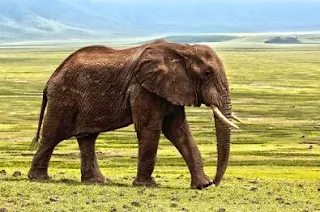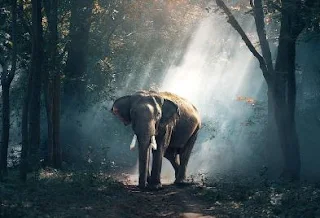Elephants are among the most popular and admired animals on the planet. Elephants have become important figures not only in the animal realm, but also in many rural and traditional cultures, because of their precious ivory tusks, which are utilized to move heavy freight or as fundamental symbols in religious rites.
Elephants can weigh anything between 6,000 and 15,000 pounds, are herbivores that enjoy the occasional sweet banana and sugarcane, and prefer to roam and hunt in large groups.
However, the Elephant has a plethora of distinct and brilliant characteristics that are generally unknown. The following is a list of ten incredible elephant facts that will astound even the most observant elephant fan.
Elephant Facts That Will Astound You
1. Have you ever wondered how elephant herds communicate across large distances? Their occasional whine would be a good guess, but not quite as exciting as the answer. Elephant pacts may stomp the ground with their feet, producing sub-sonic vibrations across the ground that the receiving pact can absorb through the sensitive nerves in their feet, according to studies! This earth-shaking roar is so intense and quick that it travels through the air faster than sound waves.
2. Elephants are herbivores, but that doesn't mean they'll eat anything that isn't a dead animal. Elephants have certain feeding preferences, and peanuts are not one of them. Elephants despise the woody flavor of peanuts so much that they avoid them in the wild, and caretakers in zoos are cautious not to feed them.
3. Elephants are not only fascinated by sand; it is necessary for them. Elephants, despite their robust, weather-worn wrinkled skin, are prone to becoming burnt. Elephants cover themselves in sand using their trunks to hurl it over their backs and legs to protect themselves from the sun's harsh rays.
This technique protects the skin from harmful UV rays and stinging insects. Elephants avoid rubbing their young in sand because their skin is more sensitive.
4. How much food and water does an Elephant need to keep strong and healthy on a daily basis? Elephants may drink up to forty gallons of water per day and eat up to 400 pounds of food per day to stay alive.
5. Elephants grow six sets of twenty-six teeth throughout the course of their seventy years, whereas humans only have two sets of teeth (milk teeth and permanent teeth). Each new set of teeth pushes out the previous ones and takes root. If this process is prevented for some reason, an Elephant may die of malnutrition.
6. An Elephant's tusks, along with its trunk, are the most distinguishing features. Asian Elephants, unlike African Elephants, do not all have tusks. Female Asian Elephants do not have tusks, and only a few male Asian Elephants are born with these extremely desirable characteristics.
7. Elephants can captivate onlookers with their ground communication techniques, walk at a creeping speed of four miles per hour, and swim for extended distances. Because of its massive size, the Elephant is unable to jump or gallop away when threatened.
8. Matriarchal elephant herds are led by the most experienced or elderly elephant. Males and females alike will follow her lead, but males are more likely to quit the herd after twelve years to join their male counterparts.
9. An Elephant's legs are maybe the strongest parts of its entire body. Because the Elephant does not sleep lying down, its legs do not become readily exhausted although carrying more than 6,000 pounds of weight. The Elephant's pillar-like legs are so strong that it can sleep standing up for two to three hours before returning to eat or migrate from one location to another.
10. An Elephant's trunk contains hundreds of nerves, and many years of study have revealed that elephants are highly emotional creatures capable of copying noises, feeling sadness, joy, and fury. Even more fascinating is how many emotional and traditional characteristics Elephants share with humans.
Elephants suck their trunks for comfort in the same way that neonatal humans suck their thumbs. In terms of custom, Elephants form pacts with one another, and when one becomes old or sick, the Elephant's fellow Elephants band together to help the Elephant eat, drink, and stand.
When such efforts fail and the Elephant dies, funeral processions are organized in which Elephants cease their journeys, sit in quiet, weep, and then bury the Elephant by excavating a ditch and covering the body with sand.


